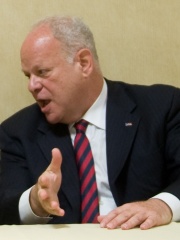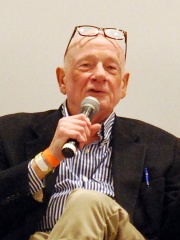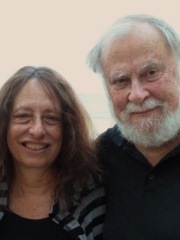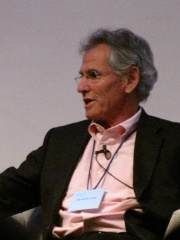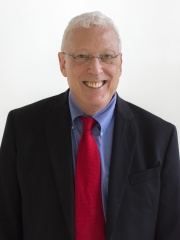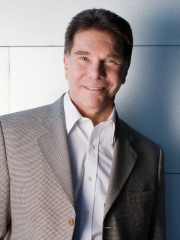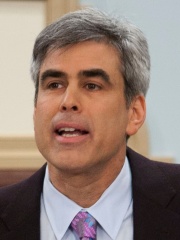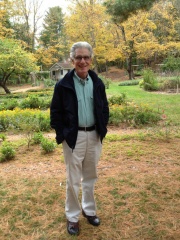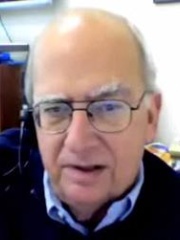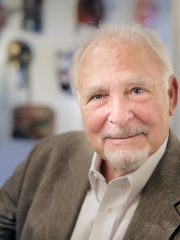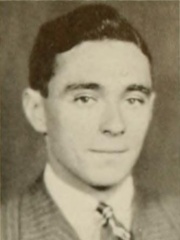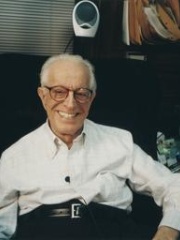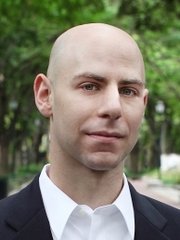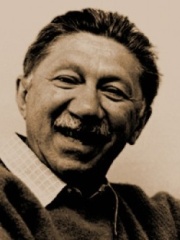

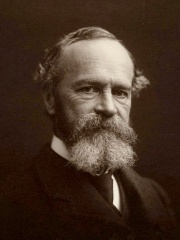
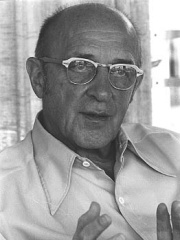
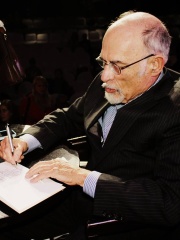
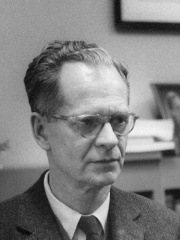
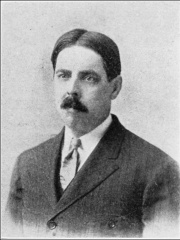
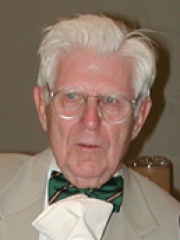
The Most Famous
PSYCHOLOGISTS from United States
This page contains a list of the greatest American Psychologists. The pantheon dataset contains 235 Psychologists, 91 of which were born in United States. This makes United States the birth place of the most number of Psychologists.
Top 10
The following people are considered by Pantheon to be the top 10 most legendary American Psychologists of all time. This list of famous American Psychologists is sorted by HPI (Historical Popularity Index), a metric that aggregates information on a biography's online popularity. Visit the rankings page to view the entire list of American Psychologists.

1. Abraham Maslow (1908 - 1970)
With an HPI of 80.93, Abraham Maslow is the most famous American Psychologist. His biography has been translated into 74 different languages on wikipedia.
Abraham Harold Maslow ( MAZ-loh; April 1, 1908 – June 8, 1970) was an American psychologist who created Maslow's hierarchy of needs, a theory of psychological health predicated on fulfilling innate human needs in priority, culminating in self-actualization. Maslow was a psychology professor at Cornell University, Brooklyn College, Brandeis University, The New School for Social Research, and Columbia University. He stressed the importance of focusing on the positive qualities in people, as opposed to treating them as a "bag of symptoms". A Review of General Psychology survey, published in 2002, ranked Maslow as the tenth most cited psychologist of the 20th century.

2. John Dewey (1859 - 1952)
With an HPI of 78.90, John Dewey is the 2nd most famous American Psychologist. His biography has been translated into 81 different languages.
John Dewey (; October 20, 1859 – June 1, 1952) was an American philosopher, psychologist, and educational reformer. He was one of the most prominent American scholars in the first half of the twentieth century. The overriding theme of Dewey's works was his profound belief in democracy, be it in politics, education, or communication and journalism. As Dewey himself stated in 1888, while still at the University of Michigan, "Democracy and the one, ultimate, ethical ideal of humanity are to my mind synonymous." Dewey considered two fundamental elements—schools and civil society—to be major topics needing attention and reconstruction to encourage experimental intelligence and plurality. He asserted that complete democracy was to be obtained not just by extending voting rights but also by ensuring that there exists a fully formed public opinion, accomplished by communication among citizens, experts, and politicians. Dewey was one of the primary figures associated with the philosophy of pragmatism and is considered one of the founding thinkers of functional psychology. His paper "The Reflex Arc Concept in Psychology", published in 1896, is regarded as the first major work in the (Chicago) functionalist school of psychology. A Review of General Psychology survey, published in 2002, ranked Dewey as the 93rd-most-cited psychologist of the 20th century. Dewey was also a major educational reformer for the 20th century. A well-known public intellectual, he was a major voice of progressive education and liberalism. While a professor at the University of Chicago, he founded the University of Chicago Laboratory Schools, where he was able to apply and test his progressive ideas on pedagogical method. Although Dewey is known best for his publications about education, he also wrote about many other topics, including epistemology, metaphysics, aesthetics, art, logic, social theory, and ethics.

3. William James (1842 - 1910)
With an HPI of 78.62, William James is the 3rd most famous American Psychologist. His biography has been translated into 86 different languages.
William James (January 11, 1842 – August 26, 1910) was an American philosopher and psychologist. The first educator to offer a psychology course in the United States, he is considered to be one of the leading thinkers of the late 19th century, one of the most influential philosophers and is often dubbed the "father of American psychology." Born into a wealthy family, James was the son of the Swedenborgian theologian Henry James Sr. and the brother of both the prominent novelist Henry James and the diarist Alice James. James trained as a physician and taught anatomy at Harvard, but never practised medicine. Instead, he pursued his interests in psychology and then philosophy. He wrote widely on many topics, including epistemology, education, metaphysics, psychology, religion, and mysticism. Among his most influential books are The Principles of Psychology, a groundbreaking text in the field of psychology; Essays in Radical Empiricism, an important text in philosophy; and The Varieties of Religious Experience, an investigation of different forms of religious experience, including theories on mind-cure. Along with Charles Sanders Peirce, James established the philosophical school known as pragmatism, and is also cited as one of the founders of functional psychology. A Review of General Psychology analysis, published in 2002, ranked James as the 14th most eminent psychologist of the 20th century. A survey published in American Psychologist in 1991 ranked James's reputation in second place, after Wilhelm Wundt, who is widely regarded as the founder of experimental psychology. James also developed the philosophical perspective known as radical empiricism. James's work has influenced philosophers and academics such as Alan Watts, W. E. B. Du Bois, Edmund Husserl, Bertrand Russell, Ludwig Wittgenstein, Hilary Putnam, and Richard Rorty.

4. Carl Rogers (1902 - 1987)
With an HPI of 78.56, Carl Rogers is the 4th most famous American Psychologist. His biography has been translated into 62 different languages.
Carl Ransom Rogers (January 8, 1902 – February 4, 1987) was an American psychologist who was one of the founders of humanistic psychology and was known especially for his person-centered psychotherapy. Rogers is widely considered one of the founding fathers of psychotherapy research and was honored for his research with the Award for Distinguished Scientific Contributions by the American Psychological Association (APA) in 1956. The person-centered approach, Rogers's approach to understanding personality and human relationships, found wide application in various domains, such as psychotherapy and counseling (client-centered therapy), education (student-centered learning), organizations, and other group settings. For his professional work he received the Award for Distinguished Professional Contributions to Psychology from the APA in 1972. In a study by Steven J. Haggbloom and colleagues using six criteria such as citations and recognition, Rogers was found to be the sixth most eminent psychologist of the 20th century and second, among clinical psychologists, only to Sigmund Freud. Based on a 1982 survey of 422 respondents of U.S. and Canadian psychologists, he was considered the most influential psychotherapist in history (Freud ranked third).
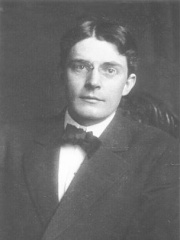
5. John B. Watson (1878 - 1958)
With an HPI of 75.34, John B. Watson is the 5th most famous American Psychologist. His biography has been translated into 59 different languages.
John Broadus Watson (January 9, 1878 – September 25, 1958) was an American psychologist who popularized the scientific theory of behaviorism, establishing it as a psychological school. Watson advanced this change in the psychological discipline through his 1913 address at Columbia University, titled Psychology as the Behaviorist Views It. Through his behaviorist approach, Watson conducted research on animal behavior, child rearing, and advertising, as well as conducting the controversial "Little Albert" experiment and the Kerplunk experiment. He was also the editor of Psychological Review from 1910 to 1915. A Review of General Psychology survey, published in 2002, ranked Watson as the 17th most cited psychologist of the 20th century.

6. Irvin D. Yalom (b. 1931)
With an HPI of 75.24, Irvin D. Yalom is the 6th most famous American Psychologist. His biography has been translated into 37 different languages.
Irvin David Yalom (; born June 13, 1931) is an American existential psychiatrist who is an emeritus professor of psychiatry at Stanford University, as well as author of both fiction and nonfiction.

7. B. F. Skinner (1904 - 1990)
With an HPI of 75.08, B. F. Skinner is the 7th most famous American Psychologist. His biography has been translated into 67 different languages.
Burrhus Frederic Skinner (March 20, 1904 – August 18, 1990) was an American psychologist, behaviorist, inventor, and social philosopher. He was the Edgar Pierce Professor of Psychology at Harvard University from 1948 until his retirement in 1974. Skinner developed behavior analysis, especially the philosophy of radical behaviorism, and founded the experimental analysis of behavior, a school of experimental research psychology. He also used operant conditioning to strengthen behavior, considering the rate of response to be the most effective measure of response strength. To study operant conditioning, he invented the operant conditioning chamber (aka the Skinner box), and to measure rate he invented the cumulative recorder. Using these tools, he and Charles Ferster produced Skinner's most influential experimental work, outlined in their 1957 book Schedules of Reinforcement. Skinner was a prolific author, publishing 21 books and 180 articles. He imagined the application of his ideas to the design of a human community in his 1948 utopian novel, Walden Two, while his analysis of human behavior culminated in his 1958 work, Verbal Behavior. Skinner, John B. Watson and Ivan Pavlov, are considered to be the pioneers of modern behaviorism. Accordingly, a June 2002 survey listed Skinner as the most influential psychologist of the 20th century.

8. Edward Thorndike (1874 - 1949)
With an HPI of 74.93, Edward Thorndike is the 8th most famous American Psychologist. His biography has been translated into 56 different languages.
Edward Lee Thorndike ((1874-08-31)August 31, 1874 – (1949-08-09)August 9, 1949) was an American psychologist who spent nearly his entire career at Teachers College, Columbia University. His work on comparative psychology and the learning process led to his "theory of connectionism" and helped lay the scientific foundation for educational psychology. He also worked on solving industrial problems, such as employee exams and testing. Thorndike was a member of the board of the Psychological Corporation and served as president of the American Psychological Association in 1912. A Review of General Psychology survey, published in 2002, ranked Thorndike as the ninth-most cited psychologist of the 20th century. Edward Thorndike had a powerful impact on reinforcement theory and behavior analysis, providing the basic framework for empirical laws in behavior psychology with his law of effect. Through his contributions to the behavioral psychology field came his major impacts on education, where the law of effect has great influence in the classroom.

9. Aaron T. Beck (1921 - 2021)
With an HPI of 73.89, Aaron T. Beck is the 9th most famous American Psychologist. His biography has been translated into 33 different languages.
Aaron Temkin Beck (July 18, 1921 – November 1, 2021) was an American psychiatrist who was a professor in the department of psychiatry at the University of Pennsylvania. He is regarded as the father of cognitive therapy and cognitive behavioral therapy (CBT). His pioneering methods are widely used in the treatment of clinical depression and various anxiety disorders. Beck also developed self-report measures for depression and anxiety, notably the Beck Depression Inventory (BDI), which became one of the most widely used instruments for measuring the severity of depression. In 1994 he and his daughter, psychologist Judith S. Beck, founded the nonprofit Beck Institute for Cognitive Behavior Therapy, which provides CBT treatment and training, as well as research. Beck served as President Emeritus of the organization up until his death. Beck was noted for his writings on psychotherapy, psychopathology, suicide, and psychometrics. He published more than 600 professional journal articles, and authored or co-authored 25 books. He was named one of the "Americans in history who shaped the face of American psychiatry", and one of the "five most influential psychotherapists of all time" by The American Psychologist in July 1989.
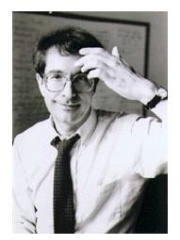
10. Howard Gardner (b. 1943)
With an HPI of 72.88, Howard Gardner is the 10th most famous American Psychologist. His biography has been translated into 46 different languages.
Howard Earl Gardner (born July 11, 1943) is an American developmental psychologist and the John H. and Elisabeth A. Hobbs Research Professor of Cognition and Education at Harvard University. He was a founding member of Harvard Project Zero in 1967 and held leadership roles at that research center from 1972 to 2023. Since 1995, he has been the co-director of The Good Project. Gardner has written hundreds of research articles and over thirty books that have been translated into over thirty languages. He is best known for his theory of multiple intelligences, as outlined in his 1983 book Frames of Mind: The Theory of Multiple Intelligences. Gardner retired from teaching in 2019. In 2020, he published his intellectual memoir A Synthesizing Mind. He continues his research and writing, including several blogs.
People
Pantheon has 91 people classified as American psychologists born between 1842 and 1981. Of these 91, 23 (25.27%) of them are still alive today. The most famous living American psychologists include Irvin D. Yalom, Howard Gardner, and Martin Seligman. The most famous deceased American psychologists include Abraham Maslow, John Dewey, and William James. As of April 2024, 3 new American psychologists have been added to Pantheon including Geoffrey Miller, Adam Grant, and Amy Cuddy.
Living American Psychologists
Go to all RankingsIrvin D. Yalom
1931 - Present
HPI: 75.24
Howard Gardner
1943 - Present
HPI: 72.88
Martin Seligman
1942 - Present
HPI: 69.50
Raymond Moody
1944 - Present
HPI: 68.86
Carol Gilligan
1936 - Present
HPI: 65.70
Jon Kabat-Zinn
1944 - Present
HPI: 64.49
Robert Sternberg
1949 - Present
HPI: 64.33
Robert Cialdini
1945 - Present
HPI: 63.24
Jonathan Haidt
1963 - Present
HPI: 63.05
Elizabeth Loftus
1944 - Present
HPI: 62.65
Brian Weiss
1944 - Present
HPI: 62.29
Michael Gazzaniga
1939 - Present
HPI: 60.94
Deceased American Psychologists
Go to all RankingsAbraham Maslow
1908 - 1970
HPI: 80.93
John Dewey
1859 - 1952
HPI: 78.90
William James
1842 - 1910
HPI: 78.62
Carl Rogers
1902 - 1987
HPI: 78.56
John B. Watson
1878 - 1958
HPI: 75.34
B. F. Skinner
1904 - 1990
HPI: 75.08
Edward Thorndike
1874 - 1949
HPI: 74.93
Aaron T. Beck
1921 - 2021
HPI: 73.89
Gordon Allport
1897 - 1967
HPI: 72.50
Paul Ekman
1934 - 2025
HPI: 72.26
Jerome Bruner
1915 - 2016
HPI: 71.83
Albert Ellis
1913 - 2007
HPI: 71.49
Newly Added American Psychologists (2025)
Go to all RankingsOverlapping Lives
Which Psychologists were alive at the same time? This visualization shows the lifespans of the 25 most globally memorable Psychologists since 1700.

